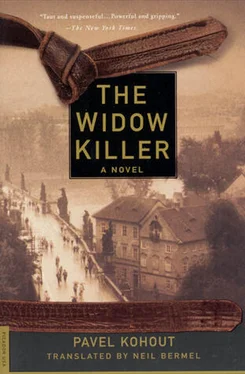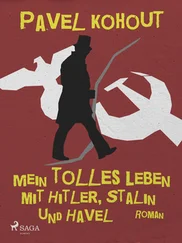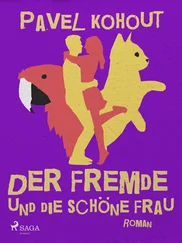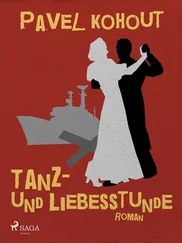Buback fixed his eyes on the sergeant’s; keep your fingers crossed, Grete, he thought superstitiously.
“I need to see Superintendent Beran,” he requested firmly. “I’m working with him.”
This name made an impact. He could see that they all knew it.
“Take him over there,” the sergeant ordered the two men, who had meanwhile locked elbows with Buback. “Make sure nothing happens to him until they find the superintendent. And if he’s feeding us a line, then do what you want with him.”
There were more surprises in store for Morava. The car did not return to the police complex on Bartolom  jská. Instead, Litera swung off Na Per
jská. Instead, Litera swung off Na Per  týn
týn  Street into Husova Street and from there into a long, dark alleyway. They alighted in a small courtyard beneath the sign COLLIERY; the German equivalent was, of course, freshly painted out. A couple of grubby men smoking on overturned tubs greeted Beran like an old friend.
Street into Husova Street and from there into a long, dark alleyway. They alighted in a small courtyard beneath the sign COLLIERY; the German equivalent was, of course, freshly painted out. A couple of grubby men smoking on overturned tubs greeted Beran like an old friend.
“Josef, you wait here,” the superintendent said to Litera. First names? With his driver? Suddenly Morava’s familiar world seemed utterly foreign.
“And you’re with me,” Beran called out to him.
They entered an office where two policemen sat with rifles and cartridge pouches. The men hastily stood, but Beran nodded for them to sit and headed down into the basement. From the firm’s giant wood and coal storerooms they slipped through a newly made hole in the wall into a small cellar for tenants. Wooden crosspieces divided the area into cells; the last one was open and empty, and an opening at the back led into the neighboring building.
In the next cellar, several policemen were unpacking weapons and ammunition from crates, carefully cleaning the rifles and standing them in rows against the walls, and placing the boxed cartridges and hand grenades on boards laid across sawhorses. The men took no notice of the arrivals, and Beran strode past them without looking around. Morava’s surprise grew. Was there another Prague, another police force, another Beran he knew nothing about?
Apparently so, for suddenly they were in an extensive vault with a Gothic ceiling, full of people in police uniforms and civilian garb; there must have been thirty of them in various corners and from various divisions. Morava recognized the faces of his department’s technicians. At the sight of the superintendent their conversations gradually trailed off, and in a few seconds silence had descended.
“How does it work?” Beran asked.
“So far we’ve only tried gramophone music,” volunteered Veselý, who on the surface ran the telephone and telegraph exchanges, pointing at an antique machine with a horn, “but they’ve confirmed that it comes out all over Prague. Now they’re checking the backup stations in Vinohrady and Nusle; once they’re done, we can start whenever we want.”
“Good work,” said Beran, “very good. Is Brunát here?”
“Hej!” affirmed the bearded sixtyish superintendent of the transit police, in the one word of Slovak left him after his prewar service in Slovakia. He had just appeared through a tunnel from the basement opposite. “Here’s the council’s resolution.”
Morava realized that a system of tunnels and escape routes must have been prepared in all the police buildings on Bartolom  jská.
jská.
Beran read over the paper and then addressed the crowd in a steely voice.
“Colleagues, up till now we have introduced you into Resistance activities gradually and sparingly, so as not to needlessly threaten our conspiracy. All of you here enjoy my confidence and that of my friend Brunát, and we have now pledged our loyalty to a new political organization: the Czech National Council, which is the temporary representative of the Czechoslovak government, located for the moment in liberated Ko  ice. In accordance with its resolution, I hereby absolve you of all obligations arising from professional oaths taken to the occupiers. The Czech police is the best organized and best armed civilian group — albeit modestly so — and has therefore been entrusted with a crucial task: to ensure the transfer of power with as few casualties as possible, protecting our people and our town. Now that peace is in sight, we cannot let Prague meet the fate of Europe’s other cities, a fate it has so far been spared. We are not to mount a headstrong, all-out attack — we don’t have the resources for it — but to engage in strategic and principled confrontation backed by careful use of force. There are as many possible variations as moves in a chess game; therefore we have decided not to commit ourselves to any in advance, and instead to retain flexibility of planning and reaction. The first announcement inaugurating our regular city radio broadcasts“—here he waved the paper in the air—“contains an appeal for calm, order, and reason that will be welcomed by the Germans. However, word combinations in the text contain hidden instructions to our neighborhood offices and primary Resistance groups, who will begin the immediate, unobtrusive isolation of German units and offices located directly in the capital.
ice. In accordance with its resolution, I hereby absolve you of all obligations arising from professional oaths taken to the occupiers. The Czech police is the best organized and best armed civilian group — albeit modestly so — and has therefore been entrusted with a crucial task: to ensure the transfer of power with as few casualties as possible, protecting our people and our town. Now that peace is in sight, we cannot let Prague meet the fate of Europe’s other cities, a fate it has so far been spared. We are not to mount a headstrong, all-out attack — we don’t have the resources for it — but to engage in strategic and principled confrontation backed by careful use of force. There are as many possible variations as moves in a chess game; therefore we have decided not to commit ourselves to any in advance, and instead to retain flexibility of planning and reaction. The first announcement inaugurating our regular city radio broadcasts“—here he waved the paper in the air—“contains an appeal for calm, order, and reason that will be welcomed by the Germans. However, word combinations in the text contain hidden instructions to our neighborhood offices and primary Resistance groups, who will begin the immediate, unobtrusive isolation of German units and offices located directly in the capital.
Gentlemen, good luck with your instructions and I’ll see you at thirteen hundred hours, when we begin.”
He gave the exact time, and thirty men synchronized their watches.
“Brunát, Morava,” the superintendent called, and when both had come over he added in a low voice, “time for the three of us to give Rajner what he’s got coming.”
“You have an urgent visitor,” Brunát informed him.
“Who?”
“Your German inspector is here with an escort.”
“Gestapo?” Beran said warily.
“No need to worry. Our men brought him in. They assumed he was Gestapo; only the fact that he asked for you saved him.”
“What does he want?”
“To speak with you or Morava; he supposedly has news that can’t wait.”
“When did he arrive?”
“Not fifteen minutes ago.”
“Him first, then,” the superintendent said, picking up the pace. “Where is he?”
“You assigned him an office, didn’t you?”
A thousand arrests made, but his first time arrested! Buback grinned, but did not feel like laughing. He sat at his old, familiar desk, its surface covered with carefully arranged reports on the widow killer. The one very basic difference was that now the key, turned twice in the lock for extra security, was in the far side of the keyhole.
He had no one to call, but tried the telephone anyway. Of course they had disconnected it; they weren’t amateurs. At least he felt safer here than he had with those policemen, whose patriotism had begun to affect their judgment.
The Rubicon! Caesar’s fateful river came suddenly to mind. Now Buback was about to cross his own, and he knew that nothing would be the same afterward. He’d gone too far to stop or turn back, though, so he simply cleared his mind and waited. Soon thereafter, the key turned in the lock and the superintendent and his assistant entered. With them was an unfamiliar man who reminded him of an old but still powerful lion.
“Good morning,” Beran said in the same tone he had always used. “I heard you wanted to speak with us. This is my colleague Brunát; he and I have been temporarily entrusted with running the Czech police.”
“Nice to meet you,” said the lion, amiably baring his formidable teeth. “I might add that the former commissioner doesn’t yet know of his good fortune.”
Читать дальше

 jská. Instead, Litera swung off Na Per
jská. Instead, Litera swung off Na Per  týn
týn 










